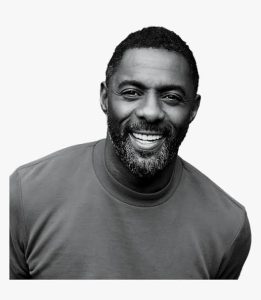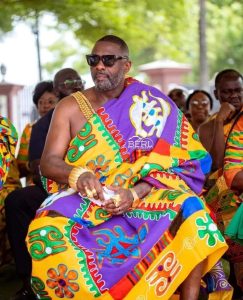The recent announcement of Idris Elba’s casting as Okonkwo in the upcoming TV adaptation of Chinua Achebe’s Things Fall Apart has ignited widespread controversy among Nigerians. The debate goes beyond Elba’s acting abilities and touches on deeper concerns regarding the representation and preservation of cultural authenticity in one of Africa’s most celebrated literary works.
Elba, known for his powerful performances in Beasts of No Nation, Mandela: Long Walk to Freedom, and The Wire, is undoubtedly a versatile actor. Yet, his selection to play Okonkwo—a character deeply rooted in Igbo culture—has raised concerns about whether someone without a direct connection to this cultural heritage can fully capture the essence of the role. Okonkwo is more than just a literary figure; he is a symbol of the Igbo people’s struggle to maintain their traditions in the face of colonial disruption.
Critics argue that while Elba possesses immense talent, his suave persona may not align with Okonkwo’s raw, unyielding nature. The central concern revolves around how someone not intimately familiar with the nuances of Igbo culture can effectively embody a character whose speech, mannerisms, and worldview are steeped in indigenous traditions. Many Nigerians worry that such a portrayal risks turning Achebe’s powerful narrative into a superficial representation of African culture tailored for a Western audience.
The backlash, especially on social media, reflects these fears. Nigerians are not merely questioning Elba’s skill but expressing unease about the potential loss of cultural specificity in adapting Achebe’s work. They point to past Hollywood missteps, particularly in representing African accents and traditions, as cause for concern. The idea of Okonkwo speaking in a misrepresented Nigerian accent or engaging in behaviors uncharacteristic of Igbo life strikes a chord with those who hold Achebe’s novel dear.
Further complicating the conversation is the broader issue of how African stories are told on the global stage. While Things Fall Apart is widely regarded as a cornerstone of world literature, there is anxiety that its adaptation may be shaped to suit foreign audiences rather than preserving its cultural integrity. Some critics view Elba’s casting as emblematic of a Western-dominated film industry, where African stories are often treated as marketable commodities rather than cultural treasures.
The irony of the situation is not lost on many observers. Achebe’s novel explores the clash between tradition and modernity, indigenous values, and foreign influences. Casting Elba, a Westernized African actor, as a man who fiercely resisted colonial domination strikes some as an ironic twist. Okonkwo’s character is defined by his steadfast refusal to change, and many believe that the adaptation should similarly resist unnecessary changes that undermine the story’s cultural roots.
Despite the criticism, some argue that storytelling should transcend cultural boundaries and that talent should be the primary consideration in casting. From this perspective, Elba’s acting abilities could bring new dimensions to the character of Okonkwo. After all, when producers acquire the rights to a story, they have the creative freedom to interpret it as they see fit. However, this perspective tends to overlook the fact that Things Fall Apart was not written for commercial purposes but to give a voice to a people whose history had been misrepresented or silenced by colonial narratives.
A significant portion of the frustration also stems from the lack of local investment in adapting classic Nigerian stories. Some Nigerians are questioning why local producers, particularly those from the Igbo community, have not taken the lead in bringing Achebe’s work to the screen. The absence of indigenous productions leaves a gap that foreign filmmakers are more than willing to fill, sparking resentment over the potential for cultural distortion.
Ultimately, the debate highlights the broader struggle over who controls the narrative of African stories in global media. The casting of Elba is not merely about one actor playing Okonkwo; it is about ownership and the ability of Africans to tell their own stories in a way that honors their culture and history.
The 1980s adaptation of Things Fall Apart is fondly remembered for launching the career of Nigerian actor Pete Edochie, who portrayed Okonkwo with profound cultural resonance. Fans of Achebe’s work are concerned that this new adaptation might stray too far from the authenticity that made the earlier version so impactful. As the controversy unfolds, many hope that the adaptation will do justice to Achebe’s legacy and that the importance of Igbo culture is not lost in the process.
Nigerians are also raising practical concerns about the production, including the portrayal of accents and language. With over 250 ethnic groups in Nigeria, each with its distinct accent and linguistic traditions, there is anxiety about how Hollywood will handle this diversity. Many are calling for the involvement of Nigerian actors such as Stan Nze or Uzo Arukwe, who could bring the necessary cultural depth to the role of Okonkwo.
Moreover, the involvement of a Yoruba executive producer and a British actor in a project so deeply rooted in Igbo culture has fueled concerns of tribalism and potential cultural misrepresentation. As the debate rages on, it is clear that this adaptation of Things Fall Apart is more than just a television series—it is a reflection of the ongoing struggle for African stories to be told authentically on the global stage.
For now, many Nigerians are waiting anxiously to see how this high-profile adaptation will unfold, hoping it stays true to Achebe’s vision and the cultural essence of the Igbo people.
Daniel Nsa




